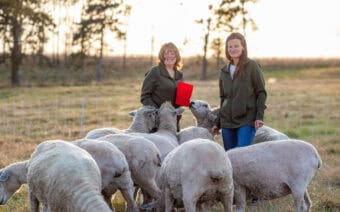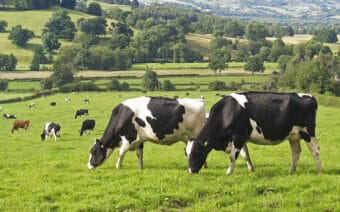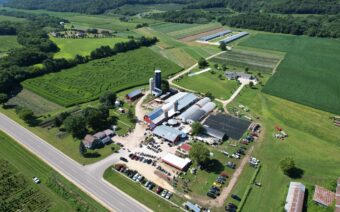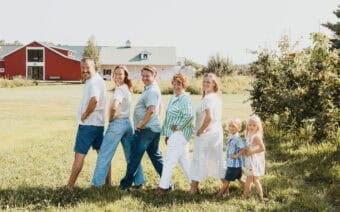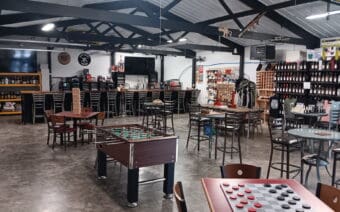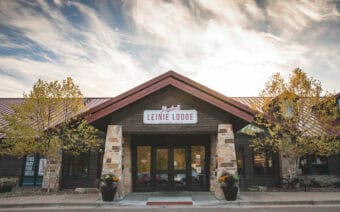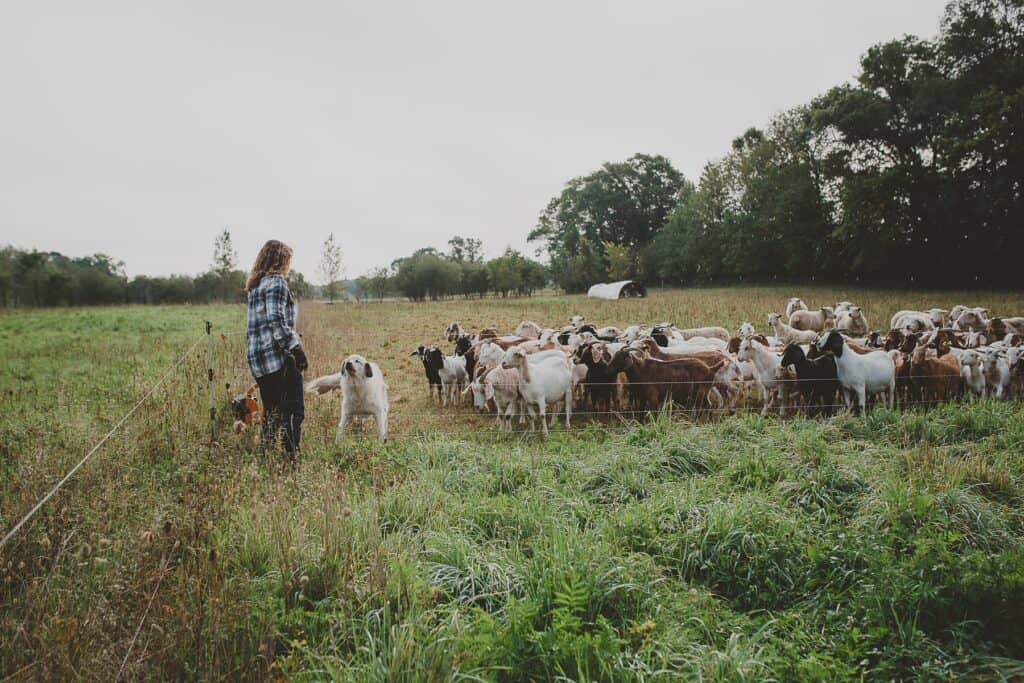
July 21, 2025
DEER PARK – During most of the year, Cylon Rolling Acres’ herd of approximately 70 Boer-Kiko cross meat goats graze on the property’s 140 acres.
These regenerative agriculture practices, first-generation farmer Leslie Svacina said, are at the foundation of everything she does on the farm.
Svacina said the farm’s practices aren’t about checking the sustainability box; rather, they’re focused on improving the land to make it better – not just for Cylon Rolling Acres, but for the ecosystem above and below the ground.
Why goats?
Though she didn’t grow up in a farm environment, Svacina said she did grow up in a family full of passionate entrepreneurs and small business owners, and said the proverbial apple didn’t fall far from the tree.
She said she and her husband, Scott, knew they wanted something of their own and ideally have it be agriculture related.
As they looked into options from a business standpoint, Svacina said goats became the animal they raised, out of pure opportunity.
“Since I was the one managing the farm full-time on my own, working with small ruminants and small livestock is something I could do on my own,” she said. “Secondly, with the changing demographics in the region, it made more sense (to raise goats).”
Svacina said this includes demographics in Wisconsin and in the Twin Cities, where goat is a preferred protein.
She said she recognized that much of the goat meat in stores was being imported from Australia, and was not as readily available as other proteins at the grocery store, making it a specialty item.
This, Svacina said, was her “aha” moment and what inspired her to pursue raising goats as a part of their farm business.
What makes Cylon Rolling Acres different?
Svacina said two things unique to Cylon Rolling Acres are its regenerative farming practices and selling directly to consumers.
With the use of rotational grazing with their animals – as long as there’s not snow on the ground – Svacina said the animals move to a fresh pasture almost daily.
This, she said, provides many benefits to the soil, the environment and the animals themselves.
“It does take time, but a lot of folks who raise goats don’t do that,” she said. “It’s not necessarily a bad thing, but having more access to more land gives more fresh opportunities for food sources and natural land regeneration.”
In addition to rotational grazing, per cylonrollingacres.com, the farm utilizes other sustainable practices, including:
- Perennial pastures, crops (hay for winter feeding) – an approach that means most of the time the farm isn’t doing any type of tillage to disturb the soil
- Bale grazing – which includes feeding round bales of hay strategically on pasture in the winter, which allows Svacina to improve parts of the pasture while goats are fed on hay
- Oak savanna restoration – a grove of old-growth trees that were part of the pasture at one time, that Svacina is in the process of renovating to remove the invasive species and reestablish the grasses
According to the farm’s website, the success of these practices can be seen in resident wildlife like birds, deer, insects and worms.
Furthermore, the farm, per the website, continues to see diversity in plant species – some of which Svacina has planted, and others that have come in on their own.
Direct-to-market sales
Svacina said Cylon Rolling Acres is a direct-to-market farm, which means she works with small-scale USDA butcher shops that package the meat before she ships it out.
She said they opted to outsource the butchering and packing.
Svacina said Cylon Rolling Acres sells directly to consumers via its website, shipping throughout the lower 48 states using insulated boxes with dry ice.
And in order to keep its presence local, she said they also have wholesale accounts in the western Wisconsin and Twin Cities areas.
“We have people ask if we do farmers markets, but because our product is specialty, it’s almost easier to let people connect to it individually through (our website) versus having to find us at a specific market,” she said.
Learning through the years
Svacina said the Cylon Rolling Acres dream started after they bought a retired dairy and beef cattle farm in 2011.
From there, she said it took a couple of years to get things up and running properly.
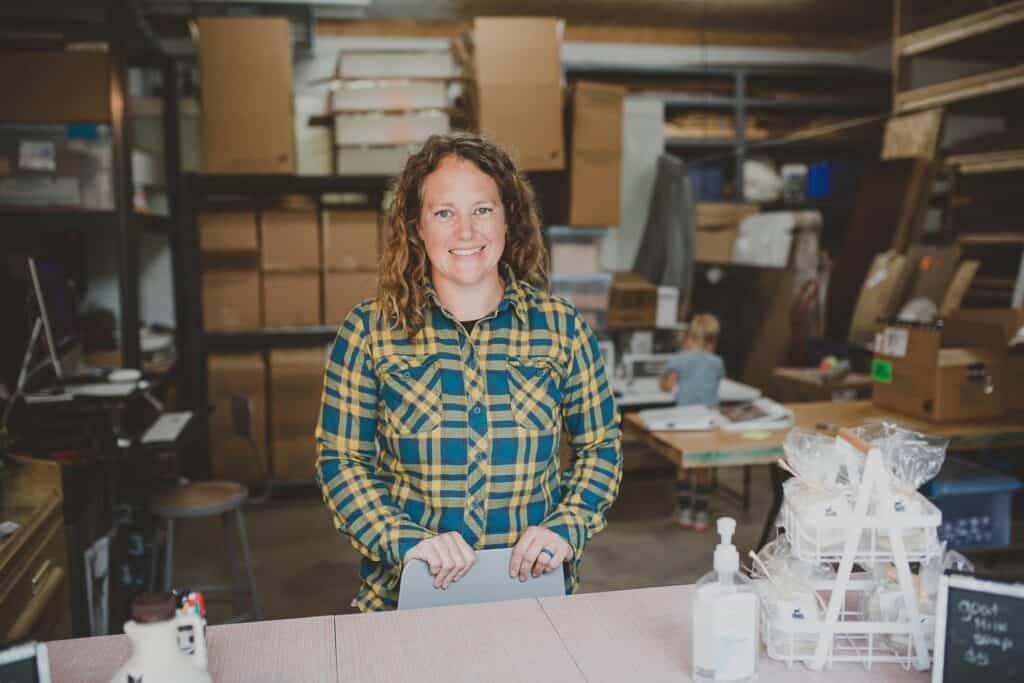
As many others do when trying to establish themselves in the market, Svacina said she started off trying many different approaches to selling their meat – which included selling wholesale and directly to individuals, in person, online and even at pop-up markets.
She said she began to notice people interested in trying goat meat who didn’t want to buy it in large amounts – which led Cylon Rollings Acres to sell cuts of meat versus whole animals.
Though the move required more licensing and risk, Svacina said it was one of the best decisions they made.
“The consumer trend that has continued is to buy a cut at a time, or maybe plan for the week or month,” she said. “Buying some rather than a large amount is more realistic.”
In the last decade, Svacina said she’s learned a lot – with the biggest lesson being: you can’t be or do everything.
As the business grew, she said she quickly recognized the need to fine-tune and focus on one or two avenues as her main focus.
Part of the fine-tuning, Svacina said, regarded her time management.
As much as she wanted to serve her customers and meet their needs, she said she had to set boundaries for work and personal life – which in turn propelled the business forward even more.
Transparency, personability
When she and Scott first started this venture, Svacina said she anticipated the Twin Cities market would be the farm’s main customer base – which she said has been true to a degree.
However, as she began establishing herself in the local community – working with other farms, participating in pop-up markets or sharing their activities on social media – Svacina said she has been pleasantly surprised by the interest in the West Central Wisconsin region.
Focused on a transparent operation, she said she believes the details she provides on the Cylon Rolling Cycles’ website about its farming practices further strengthen consumer relationships.
“People value transparency in this day and age,” she said. “It’s an expensive protein, I recognize that. I don’t want people to buy it and be afraid to cook it. So, on our website, we have a lot of helpful guides and recipes.”
In terms of getting the word out, Svacina – who has a background in communications and marketing – said “being personable without overwhelming is key.”
“I always find it fascinating that people are curious to hear about what we do,” she said. “They ask questions, and maybe they know someone you should know.”
‘The tofu of the meat world’
Svacina said although goat meat hasn’t been as common in the U.S., it’s one of the most common meats in the world.
For those who’ve never had it, Svacina said from a health perspective, it’s comparable to beef in terms of protein and calories – though typically leaner.
When it comes to flavor, she said, the difference can be more prominent.
Svacina said cooking the meat low and slow is the key.
She said she compares goat meat to ‘the tofu of the meat world,’ as it can take on any flavor.
“You do have to be careful how you cook it, because if you overcook it, it doesn’t taste good,” she said. “That’s why the low and slow stew works so well with it.”
Surprisingly, Svacina said she never ate goat meat until they started raising their animals.
As the farm started selling different cuts, she said it was important to her to figure out the many ways it could be cooked.
Though she doesn’t consider herself an expert, Svacina said she has enjoyed dabbling in different styles of cooking and has learned a lot from her customers and how they cook it.
“In the age of social media, I think the foodie culture is even more prominent,” she said. “I think it’s given traction to things like goat meat, because it’s about having the true food experience. You need to get the right ingredients and products for something to taste good.”
Education
Because Cylon Rolling Acres is a working farm – and is where her family lives – Svacina said they don’t give tours.
However, as a way for her to connect with the goat farming community, she said she started a blog called “Grazing with Leslie” on Cylon Rolling Acres’ website.
There, Svacina said she focuses on content for farmers and ranchers who want to learn more about raising, grazing and marketing their goat products, as well as for homesteaders who want to raise goats.
 Honoring family history, while embracing the future
Honoring family history, while embracing the future Waseda Farms: ‘Trust where your food comes from’
Waseda Farms: ‘Trust where your food comes from’


